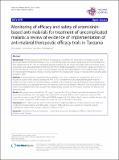| dc.contributor.author | Shayo, Alex | |
| dc.contributor.author | Buza, Joram | |
| dc.contributor.author | Ishengoma, Deus | |
| dc.date.accessioned | 2019-10-10T06:21:55Z | |
| dc.date.available | 2019-10-10T06:21:55Z | |
| dc.date.issued | 2015 | |
| dc.identifier.uri | DOI 10.1186/s12936-015-0649-8 | |
| dc.identifier.uri | http://dspace.nm-aist.ac.tz/handle/123456789/475 | |
| dc.description | Research Article published by BioMed Central | en_US |
| dc.description.abstract | Background: Prompt diagnosis and effective treatment are considered the cornerstones of malaria control and
artemisinin-based combination therapy (ACT) is currently the main anti-malarial drugs used for case management.
After deployment of ACT due to widespread parasite resistance to the cheap and widely used anti-malarial drugs,
chloroquine and sulphadoxine/pyrimethamine, the World Health Organization recommends regular surveillance to
monitor the efficacy of the new drugs. The present paper assessed the implementation of anti-malarial efficacy testing
for monitoring the therapeutic efficacy of ACT for treatment of uncomplicated malaria in Tanzania before and after policy
changes in 2006.
Methods: A literature search was performed for published clinical trials conducted in Tanzania from 2001 to 2014. It
focused on studies which assessed at least one form of ACT for treatment of uncomplicated falciparum malaria in
children less than 10 years and reported efficacy and safety of the tested anti-malarials. References were imported into
the Endnote library and duplicates removed. An electronic matrix was developed in Microsoft Excel followed by full text
review with predetermined criteria. Studies were independently assessed and information related to ACT efficacy and
safety extracted.
Results: Nine papers were selected from 125 papers screened. The efficacy of both artemether-lumefantrine (AL) and
artesunate-amodiaquine (AS + AQ) against uncomplicated P. falciparum infections in Tanzania was high with PCRcorrected
cure rates on day 28 of 91-100% and 88-93.8%, respectively. The highest day-3 parasite positivity rate was 1.4%.
Adverse events ranged from mild to serious but were not directly attributed to the drugs.
Conclusion: ACT is efficacious and safe for treatment of uncomplicated malaria in Tanzania. However, few trials were
conducted in Tanzania before and after policy changes in 2006 and thus more surveillance should be urgently
undertaken to detect future changes in parasite sensitivity to ACT. | en_US |
| dc.language.iso | en | en_US |
| dc.publisher | BioMed Central | en_US |
| dc.subject | Combination therapy | en_US |
| dc.subject | Plasmodium falciparum and Tanzania | en_US |
| dc.title | Monitoring of efficacy and safety of artemisininbased anti-malarials for treatment of uncomplicated malaria: a review of evidence of implementation of anti-malarial therapeutic efficacy trials in Tanzania | en_US |
| dc.type | Article | en_US |

